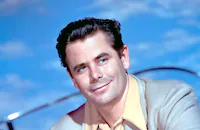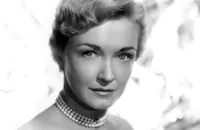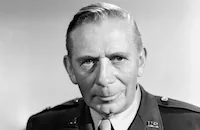Young Man With Ideas

Brief Synopsis
Cast & Crew
Mitchell Leisen
Glenn Ford
Ruth Roman
Denise Darcel
Nina Foch
Donna Corcoran
Film Details
Technical Specs

Synopsis
Self-effacing Montana attorney Maxwell Webster comes home to his wife Julie and their three young children, happy that his law firm has just won a big case, because of his research and summation writing. Max has never argued a case himself, and Julie thinks he does not get enough credit. At the firm's country club celebration that night, Julie drinks too much and drunkenly proposes a toast to the over-looked efforts of her husband. The embarrassed Max does not get angry, but in the middle of the night, Julie wakes up to find him brooding about being a failure in her eyes. She urges him to ask his boss, Edmund Jethrow, for a partnership, and the next day he does, but loses his job. Figuring that now is the perfect time to start out on his own, Max convinces Julie that they should move to Los Angeles, where the weather is warmer and opportunities greater. Because the house they planned to rent will not take children, the family moves into a California bungalow that the realtor says is in a "fast" neighborhood.
Max and Julie are content with the place, except for the two telephones that ring constantly with people trying to place bets with the bookie who used to reside there. When Max enrolls in a course to help him pass the California bar examination, he uses the last of his money for one of the books. One of his fellow students, attractive Joyce Laramie, who has failed the exam twice, recognizes Max as an excellent lawyer and suggests they study together, as she has bought all of the books. Julie is not jealous of Max's new friend, but laughs when he says that Joyce, who works for a collection agency, could get him a part time job with her company. Max is incensed that Julie does not think he could do collection work and decides to take Joyce up on her offer. On his first day on the job, Max is shocked by the subterfuge the company uses against its "deadbeat" clients and is unable to collect a single dollar. At home, Max is frantic when a man named Eddie Tasling, who telephoned that morning to place a bet, calls again, demanding his $800 winnings.
That night, when Max goes to study with Joyce, he is too embarrassed to admit that he collected nothing that day and uses his last twelve dollars to make a payment toward unemployed singer Dorianne Gray's mink stole. The next morning, when Julie notices that $12 are missing from Max's wallet, he angrily says that he spent it, but refuses to say how. As they argue, Eddie calls again and threatens them, saying that he will find out where they live by going through the telephone directory. Later, while trying to think, Max takes a walk and comes across a bar called Eddie's, then confirms that this is the same Eddie because the man keeps using the phone book to make calls. Some time later, Dorianne comes to the collection agency to pay off the balance of her stole because she has finally gotten a singing job. When she learns that the balance is $12 less than she thought, she deduces that Max made the payment and assumes that it is because he likes her. As the bar exam date approaches, Max spends more time studying at Eddie's, trying to sabotage Eddie's trek through the telephone book before he gets to the letter W. After taking the exam, as Max anxiously waits for the results, he is upset when Julie confesses that she had written to Mrs. Jethrow hoping to help him get his old job back. Max angrily says that Julie has no confidence in him, and Julie lashes out, saying that he has only tried mythical cases "in the bathroom." She then says that she is going back to Montana, and Max leaves. As he walks out, he runs into Eddie, who asks if he is the man who takes the bets, and Max answers by slugging him. Now frightened, Eddie tells his companion that he suspects Max is part of a new gang, and the two quickly drive off.
That night, when Max does not come home, a worried Julie goes to Joyce's apartment looking for him. At first Julie is jealous, but soon realizes she is wrong and the two women become friends. Meanwhile, Max is in the nightclub where Dorianne sings. While Max drunkenly tells the piano player what a good mother Julie is, mobster Brick Davis comes into the club with Eddie and sits at Max's table. Brick threatens Max if he does not pay the $800. A few moments later, Dorianne, who knows Brick, comes to the table. When Brick is first rude, then pushes Dorianne, Max takes a swing at him and a brawl ensues. At night court, Brick's lawyer tells Max to accept a plea bargain to plead guilty on a misdemeanor, but Max refuses because it would prevent him from becoming a member of the California bar. When their trial comes up in a few days, Max, who has refused to see Julie while he is in jail, tells Joyce that he is disappointed that they have so little faith in him that they have hired a "good" lawyer, and determines to defend himself.
At the trial, Dorianne and other witnesses fearfully refuse to confirm that Brick started the fight. Despite this, Max's honest summation so impresses the jury that they find Max innocent but the others guilty. After the verdict, Dorianne apologizes to Max, and Joyce informs him that they both have passed the bar. Ashamed of herself, Julie runs sobbing from the courtroom. At home, Max and Julie make up and Max tells her that Clayton, a well-known lawyer who had observed the trial was so impressed that he offered Max a junior partnership.

Director

Mitchell Leisen
Cast

Glenn Ford

Ruth Roman

Denise Darcel

Nina Foch

Donna Corcoran

Ray Collins

Mary Wickes
Bobby Diamond

Sheldon Leonard
Dick Wessel
Carl Milletaire
Curtis Cooksey
Karl Davis
Fay Roope
John Call
Nadene Ashdown
Barry Rado
Norman Rado
Wilton Graff
Martha Wentworth

Nella Walker
Louise Lorimer

Jonathan Hale

Emmett Vogan
Larry Dobkin

Robert Carson
Tom Daly
Frank Sully
Sam Pierce
Harry Brown
Charles Andrews

Roger Moore
Sam Flint
Helen Spring
Monya Andre
Charles Evans
Kay Riehl
Ray Largay
Lela Bliss
Marshall Bradford
Helene Millard
Frank Wilcox
Barbara Billingsley
Eula Guy
Dabbs Greer
Edward Cassidy
Ruth Lee
Margie Liszt
Benny Baker
Hal K. Dawson
Richard Hale
John Albright
Wheaton Chambers

John Zaremba
Dick Ryan
Wilson Wood
Eddie Simms
Tom Monroe
Earl Lee
Selmer Jackson
Joseph Mell
Billy Newell
John Trebach

Peter Brocco
Lennie Bremen
Frank Gerstle
Rudy Baron
Paul Kruger
Mack Chandler
Bert Davidson
Nikki Juston
Crew
Fred E. Ahlert
Frances Dawson
Dave Friedman
Cedric Gibbons
A. Arnold Gillespie
Jack Greenwood
Sydney Guilaroff
Hugh Hunt
Arthur Lonergan
Gottfried Reinhardt
David Rose
Joseph Ruttenberg
Douglas Shearer
Arthur Sheekman
Fredrick Y. Smith
Roy Turk
William Tuttle
Charles W. Wallace
Edwin B. Willis
William H. Wright

Videos
Movie Clip



Film Details
Technical Specs

Articles
Young Man With Ideas
Like many directors of the Golden Age, Leisen's style serviced the content of his films and the performances of their stars to the point of invisibility. He never called undue attention to the elegant, detailed surfaces of the mise-en-scene or the smooth, brisk pacing of his editing. In Leisen's movies, the stars shone brightly as he showcased their charisma, charm, and attractiveness so that the actors were memorable, even while his directorial stamp was less obtrusive. Oft times, directors like Leisen are unsung by the history books, or, at best, dubbed "minor" masters.
Young Man with Ideas reflects many of the best characteristics of the director's style though not all of them. Part of a wave of marriage "dramedies" in the early 1950s, the film follows the troubles of young couple Maxwell and Julie Webster. Maxwell is an overworked, underappreciated legal researcher who can't stand up for himself at home or in the work place. Hoping to become a lawyer in a major firm, he moves his family to California where he plans to take the bar. Julie fears that her husband's self-effacing manner will lead to failure, which derails Maxwell's confidence in passing the bar and in taking care of his family. Glenn Ford, Ruth Roman, and Nina Foch drew good notices for their energy, agility, and light-hearted charms in this film, which is largely due to Leisen's talent for nurturing stars. Much like Fred MacMurray in Leisen's Remember the Night (1940) or Don Ameche in Midnight, Glenn Ford portrays the morally conflicted leading man while still conveying a touching, everyman quality that was the essence of his character's appeal. Ruth Roman, like Claudette Colbert in Midnight or Jean Arthur in Easy Living, expressed a vivaciousness that made her hard-driving, insistent character easier to take. The key to Leisen's romantic comedies is the spark or connection between the male and female leads, displayed or ignited through interaction or dialogue. Ford and Roman communicate a tight bond in their scenes together even as their characters argue. This unity is important to convey because the plot turns on a husband's need to feel his wife's complete support.
The Websters also reflect Leisen's preference for bringing together seemingly incompatible opposites. A working-class girl falls for a rich man; a career woman finds herself in love with a man with no skills; a woman searching for a wealthy husband ends up with a poor taxi driver. In Leisen's films, the man and woman who make up the couple are often at cross purposes for most of the narrative. In Young Man with Ideas, Maxwell and Julie have opposing personalities. Maxwell is so humble and self-effacing that the law firm where he works takes him for granted. He spends endless hours researching to ensure the firm wins a big case, but they do not acknowledge his contribution at the celebratory dinner. Instead, they send him to get cigars for everyone, as though he was their errand boy. Julie, on the other hand, is outspoken, unimpressed with social position or class, and aggressively pursues her point of view no matter the impact on others. Like all marriages and relationships, the couple must learn to compromise to make their differences complement rather than work against each other.
The onscreen warmth between Roman and Ford is a testament to their acting skills because the two did not get along behind the scenes. Originally, a stage actor named Russell Nype, who was costarring in the hit Broadway musical Call Me Madam, was signed by MGM and cast as Maxwell Webster. Apparently, Roman hoped to turn Young Man with Ideas into a vehicle for herself, and she worked hard to steal the film from the young and inexperienced Nype. A week into production, Nype was replaced by Glenn Ford, whose quiet, everyman quality was better suited to the character. The change in leading men angered Roman, and in her scenes with Ford, she deliberately delivered her lines in a way that would render his responses harsh, casting his character in an unsympathetic light. Ford refused to act with Roman until she read the lines as directed, but she refused to portray her character any other way. Finally, the producers stepped in and forced her to read the lines the way Leisen instructed and the script intended.
Leisen was adept at weaving together comedy and melodrama in his films to achieve the right balance of sentiment and humor. The marital woes of Maxwell and Julie provide most of the melodrama. Adding to the comedy are several scenes involving children, including the young actresses who play the Webster daughters. Donna Corcoran, who was the sister of Disney child star Kevin Corcoran, plays oldest daughter Caroline. She steals a scene in which she and her siblings are playing "courtroom" by the front door as her father comes home for dinner. As Maxwell passes by, Caroline can be heard defending her younger sister, who is "on trial." "Sending her to prison for five years," intones Caroline, "will not bring back the candy bar." The Websters' California neighbors include a stage mother who works hard to break her untalented son, Willis, into the movies. Their scenes make for a spoof of child stars and their pushy mothers that is as accurate as it is funny.
Leisen began his career in Hollywood as a costume designer and set dresser for Cecil B. DeMille, who opened the door for him in the industry. He did the costumes for several silent classics, including Douglas Fairbanks's The Thief of Bagdad (1924) and he worked his way up to art director for DeMille on The King of Kings (1927). Leisen learned a great deal about how and where to set up the camera from DeMille, but most importantly, the master director imparted to Leisen the basis of his directorial approach: "The visual image carries more impact than dialogue." Leisen, who spent the majority of his career at Paramount, moved up to assistant director on Tonight Is Ours (1933) and The Eagle and the Hawk (1933), though he took over most of the directorial chores from Stuart Walker on both films. His first credit as director was for Cradle Song (1933), and his first significant film was Death Takes a Holiday (1934). For the rest of his career, Leisen placed the cameras himself on most of his films, and he took an extra interest in the set decoration and costume design.
Unfortunately, Leisen did not have the input on the costumes and set design for Young Man with Ideas that he had on his previous films. The film was his first after leaving Paramount, and it was produced and distributed by MGM. Cedric Gibbons, the long time art director at MGM, was in charge of the set designs for all of the studio's films. Gibbons was responsible for the studio's house style that emphasized glitzy glamour and ritzy luxury. Leisen was forced to adopt Gibbons' plans for the set designs, even though he disagreed with them. The director complained about the inappropriateness of the set decoration in an interview with David Chierichetti, author of Hollywood Director, the only full-length biography of Leisen. For the interior of a bookie joint, Gibbons opted for beautiful copper lamps with plants growing out of them, a décor too elegant for an illegal bookie operation, while a golf club in provincial Billings, Montana, was too sophisticated in its look and feel for a small-town club.
Though Young Man with Ideas is one of Leisen's lesser efforts and represents the beginning of the end of his long career, the film features a good comedic performance by Glenn Ford, some excellent supporting work from Nina Foch, a brisk pace that reveals a light directorial touch, and a reasonable perspective on the trials and tribulations of romance.
Producers: Gottfried Reinhardt and William H. Wright
Director: Mitchell Leisen
Screenplay: Arthur Sheekman, Ben Barzman
Cinematography: Joseph Ruttenberg
Editor: Frederick Y. Smith
Art Director: Cedric Gibbons and Arthur Lonergan
Music: David Rose
Cast: Maxwell Webster (Glenn Ford), Julie Webster (Ruth Roman), Joyce Laramie (Nina Foch), Dorianne Gray (Denise Darcel), Caroline Webster (Donna Corcoran), Edmund Jethrow (Ray Collins), Mrs. Gilpin (Mary Wickes), Willis Gilpin (Bobby Diamond), Brick Davis (Sheldon Leonard), Susan Webster (Nadine Ashdown).
BW-85m. Closed Captioning.
by Susan Doll

Young Man With Ideas
Quotes
Trivia
Notes
The film's working titles were Young Man in a Hurry and The Family Man. According to Hollywood Reporter news items, Gottfried Reinhardt received co-producing credit with William Wright because of the preparation work he did on the film before being reassigned to another M-G-M picture, Invitation. Other news items include Rodney Bell, Dora Sayers, Jack Gargan, Jean Acker, Margaret Farrell, Harry Cody, Helen Dickson, Jean Charney, Ruth Whitney and John Albans in the cast, but their appearance in the released film has not been confirmed. Will Wright was also included in one casting news item, but he was not in the released film.
According to various news items in Hollywood Reporter and Los Angeles Daily News, when the film began production, the actor portraying the main character, "Maxwell Webster," was Russell Nype. Nype, who was on a leave of absence from the successful Irving Berlin-scored Broadway musical Call Me Madam, was also to sing a song in the film. After ten to twelve days of production, Nype was removed from the film due to disagreements over how the character should be portrayed. Glenn Ford replaced Nype and much of the initial footage had to be re-shot. Nype returned to Call Me Madam and did not appear in another film until 1970, when he had a role in Love Story (see AFI Catalog of Feature Films, 1961-70). Although actress Elsa Lanchester is listed on the CBCS as "Mme. Johnson," neither she nor that role were in the released film. Young Man with Ideas was director Mitchell Leisen's first M-G-M film since The Squaw Man (1931, see AFI Catalog of Feature Films, 1931-40).














